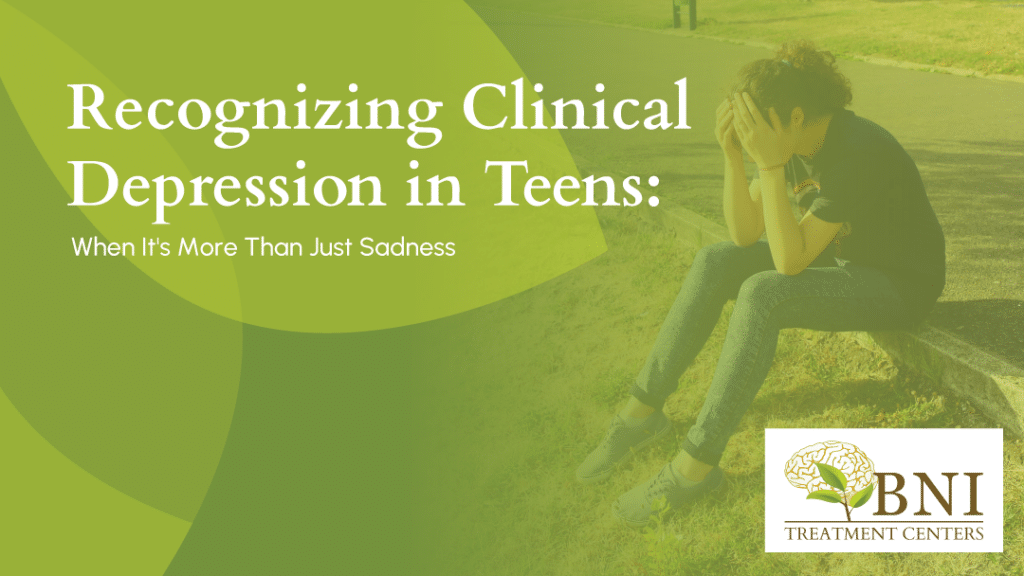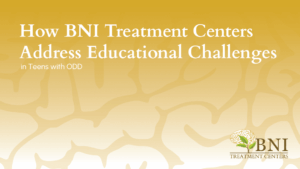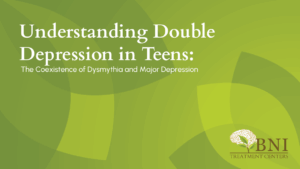
In 2023, about 269,000 California teens experienced at least one severe major depressive episode. That’s more than just sadness – it’s a characteristic of clinical depression.
What is clinical depression, and how can adults recognize it among the traditional ups and downs of adolescence? BNI Treatment Centers is a psychiatrist-owned and operated mental health facility for teens with years of expertise on this subject. We’ll share what we know.
Defining a Serious Concern: What Is Clinical Depression?
Clinical depression is a severe form of depression that interferes with every area of someone’s life. Symptoms must last most of the day, every day, for at least two weeks to classify as clinical depression, alternatively known as major depression.
Clinical Depression vs. Sadness: A Matter of Consistency
Sadness is usually triggered by a certain event and comes and goes. Clinical depression is a deep, near-constant feeling of sadness and hopelessness that sometimes manifests without reason. While sad teens might cry and isolate themselves for a little while, teens with clinical depression will feel sad and disinterested in relationships, activities, and life as a whole, for days or weeks at a time.
Even if regular sadness makes the day harder, it’s possible to set it aside and continue life as usual. Clinical depression is often debilitating and makes it difficult to function normally.

How Clinical Depression Impacts Teens and Their Lives
One of the largest areas clinical depression impacts is a teen’s time at school. 23% of all college students reported depression interfering with their academic performance in a 2023 survey, and this is an area highly relevant to adolescents as well.
Clinical depression can come with a lack of concentration, motivation, and energy, as well as cognitive complications. Adolescents with clinical depression are also more likely to stay home from school altogether and drop out of extracurricular activities due to their condition. The persistent hopelessness those with clinical depression may feel often makes them see little point in dedicating their limited energy to their studies. They may not see a future for themselves at all, making it difficult for them to set themselves up for success academically.
Clinical depression also takes a toll on teens’ social lives and general development. They may isolate themselves from others and have little energy for activities with friends and hobbies. This can cause teens with clinical depression to miss out on important experiences that would otherwise help shape them into healthy adults.
The Multiple Causes of Clinical Depression
Experts aren’t certain of what exactly causes clinical depression. More research happens daily, and these are the factors we know contribute to clinical depression so far:
- Brain chemistry, such as disturbances in neural circuitry, and neurotransmitter imbalances.
- Genetics, as individuals with a family history of clinical depression are more likely to develop the condition.
- Adverse childhood experiences (ACEs), such as bullying, abuse, accidents, loss of life, and other trauma, especially in early childhood.
- Stressful life events, especially in people with other risk factors for clinical depression.
- Substances and medications, whether alcohol, illicit drugs, or prescriptions – many have depression as a potential side effect.
Most commonly, these factors work together to cause clinical depression, but it can impact people of all ages and lifestyles.
Spotting the Signs and Symptoms of Clinical Depression in Adolescents
Being able to recognize the signs of clinical depression in adolescents is key to finding them the treatment they need. Symptoms include:
- Persistent feelings of sadness, hopelessness, or general low mood
- Irritability
- Loss of interest in activities and relationships they used to enjoy
- Appetite and weight changes
- Slowed speech, movement, and cognitive functioning
- Sleeping too much or too little
- Fatigue
- Feelings of guilt, worthlessness, and shame
- Trouble concentrating
- Suicidal ideation and/or preoccupation with death
Diagnosing Clinical Depression: What to Expect
For adolescents to receive a diagnosis of clinical depression, they must be assessed by a mental health professional. The practitioner will ask them several questions about their medical history, their symptoms, and their experiences. They may also consult with other individuals in the teen’s life to get a larger picture of how the adolescent’s mental health impacts them.
Physicians utilize the Diagnostic and Statistical Manual of Mental Disorders, Fifth Edition (DSM-5) criteria for clinical depression as a guide for diagnosis. If the adolescent meets this criteria, they’ll likely be diagnosed with clinical depression, alternatively known as major depression.

Clinical Depression Treatment for Teens in Los Angeles
Clinical depression can impact every area of a teen’s life, interfering with important years that should be spent growing and discovering who they are. Thankfully, teen depression treatment is available, and can set them back on the path to a bright and healthy future.
BNI Treatment Centers works with adolescents ages 12-17. Our psychiatrists are intimately involved in the formation and execution of every teen’s treatment plan, making it possible to diagnose and treat even the most severe and complex conditions. Clinical depression is just one of our areas of expertise. Call us at (888) 522-1504 to learn more, and take the next step to getting your teen the help they deserve.
BNI Treatment Centers: Science-based, evidence-backed, compassion-led.
FAQs
Can you live a normal life with clinical depression?
Yes, with treatment, anyone experiencing clinical depression can recover and live a fulfilling life.




